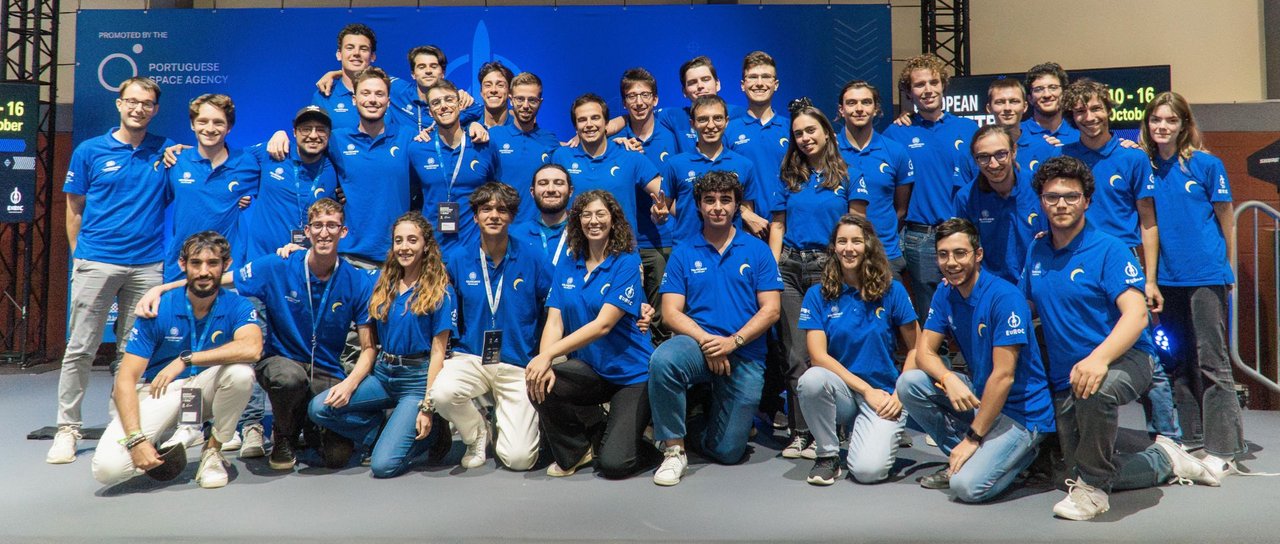EuRoC is the first rocket launch competition for European university teams. Students design experimental probe rockets that are put to the test in Pont de Sor, Portugal. Design and flight performance are two of the aspects that are assessed by the jury, in addition to the technical report and team spirit: technical skills must therefore be complemented by soft skills, team spirit and sportsmanship. This competition is also an opportunity for students to get in touch with companies in the aerospace industry.
![[Translate to English:] Team Polimi class=](/fileadmin/_processed_/b/2/csm_EuRoC_dettaglio_500x320_9cafc3667b.jpg)
The Polimi Team
Skyward Experimental Rocketry is a student association founded in 2012: today it has more than 130 members and 10 launches in the EuRoC competition. In 2023, the team competed for the first time in the 3000 metre (target) hybrid engine category with the Gemini rocket equipped with a new propulsion system: the 'Fury' hybrid engine.
Get to Know the team!
HELLO! WE KNOW THAT THE STORY OF SKYWARD EXPERIMENTAL ROCKETRY STARTED SEVERAL YEARS AGO... COULD YOU TELL US A BIT ABOUT YOURSELVES?
Yes, the team was founded in 2012 and started out as an amateur rocket launch group, but over the past three years participating in the international EuRoC competition has required the team to become more structured, both technically and organisationally.
NOW THAT YOU HAVE 130 STUDENTS, HOW DID YOU DECIDE TO ORGANISE YOURSELVES?
We are divided into departments: Aerodynamics and Flight Dynamics, Structures, Propulsion, Recovery, Logistics and Media. We have a team leader for each department and a project manager who manages the project. We have a matrix structure, widely used in companies, which allows us both to share tasks and to have both technical and administrative control over activities.
IS IT HARD WORK?
It is an activity that keeps us very busy! In the first part of the academic year, until January, we design the rocket by sketching the shapes of the prototype. After January, we move into the production phase: defining the performance of each part, comparing expected weights and possible modifications, and working to get all the different components together correctly.
On a typical day, building B21 on the Bovisa campus is full of students working on the project. The propulsion members are busy hammering away in our workshop in building B14. Often the work does not end at university, but continues at home: especially as a typical team member is thinking about Skyward 99% of the time!
AND DON'T YOU EVER GET TIRED? WHAT MOTIVATES YOU TO CONTINUE?
Definitely the passion and the desire to experience the team at 360°: to learn, to grow, to get hands-on, to go beyond the theory... otherwise no one would stay late in the lab just to see a rocket fly!
AND WHEN YOU FINALLY GET TO THE ROCKET LAUNCH, DO YOU GET EXCITED?
Of course, we still remember the excitement when we first entered EuRoC in 2021 and launched 'Lynx', realising that we were already close to the level of the most experienced teams in the competition. Then the thrill of victory in 2022 with 'Pyxis'! With newly founded associations asking us about our work and advice on projects!
BUT LET'S TALK ABOUT 'GEMINI', YOUR 2023 PROJECT, WHICH HAS HAD UPS AND DOWNS...
"Gemini' is our first rocket with a hybrid engine, the previous ones all had a solid propellant engine. It was extremely satisfying to see it flying on the plain of Roccaraso in Abruzzo, where we carried out the test launch: there was even a collective cry from the team members after so many problems, discussions and efforts!
It was a particularly stressful project: for example, the valves got stuck during a test phase and the solution did not immediately seem so simple; then, due to other technical problems, the rocket failed to take off during the EuRoC competition. It was a shame! But we are not discouraged, we are determined, we are ready to use what we have learned, we want to return to EuRoC to win. We will build another rocket with a hybrid engine, but with a different fuel, and see how it goes...

